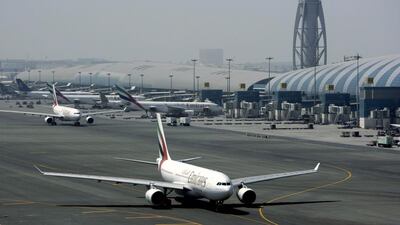Limited airport capacity, the future of air cargo and the difficulty of financing aircraft orders will top the agenda at a global gathering of the aviation industry that takes place in Miami this week amid the backdrop of the heated open skies row between Arabian Gulf carriers and their US rivals.
According to the International Air Transport Association (IATA), which hosts its annual general meeting starting Sunday, the expected rise in annual passenger numbers to 7.3 billion by 2034, more than double this year’s forecast of 3.5 billion passengers, is putting pressure on airports to ramp up their infrastructure to accommodate the growth.
The world’s top 25 airports are expected to invest US$150bn in infrastructure over the coming decade, IATA said. However, financing is not the only issue. Where to put the new capacity is another challenge – in some cases an airport’s location does not serve the airlines’ strategies.
Another key topic of discussion expected at the conference is how to make an airline “investable”. Carriers will need to raise $5 trillion to fund their new plane purchases over the next two decades. Airlines have repeatedly offered little return for investors in the past, and raising equity has proved to be challenging as a result.
On Thursday, IATA said air freight momentum slowed in April compared to late last year as business confidence and export orders remain flat despite a pick up in the global economy. IATA’s chief executive Tony Tyler said a reverse of “protectionist trade measures” was needed to kick-start activity.
Middle East air cargo volumes and capacity continue to be a bright spot despite the global trend. “In Miami [aviation leaders] will explore how the [air cargo] industry is going to make real progress,” said Mr Tyler.
Overall, the outlook for aviation is mixed, he said.
“Lower oil prices are helping to keep the cost of air travel down. The stronger US dollar, however, may dampen demand in some markets.
And it remains to be seen how long robust travel demand can stand up in the face of a trio of bad economic news – unexpectedly poor first-quarter performance in the US, continuing weakness in the euro zone and slowing regional trade in Asia Pacific,” said Mr Tyler.
Although not officially on the IATA agenda in Miami, the topic of the hour will most likely be the simmering row between the GCC’s big three airlines and their US counterparts over accusations of contraventions of open skies agreements.
Etihad Airways, Emirates and Qatar Airways have been embroiled in a bitter row since late January with Delta, American Airlines and United after the US carriers released a 55-page document detailing allegations of unfair government subsidies and other financial incentives given to Gulf carriers.
The US carriers claim their Gulf rivals have enjoyed unfair financial benefits to the tune of $42bn over the past decade, in contravention of the rules of open skies – allegations that the Gulf airlines refute.
After months of lobbed barbs in the media, a dozen reports issued to prove that the other party is wrong and appeals to the US government to review open skies, this will be the first time that the main players will all gather in one room. Etihad’s chief executive James Hogan is scheduled to speak, and his American counterparts are expected to attend, including the outspoken Delta chief Richard Anderson, the United chief Jeffery Smisek and the American boss Douglas Parker, all three of whom serve on IATA’s board of governors.
None of the airlines – US or Gulf – wanted to comment for this article. But Qatar Airways’ chief executive, Akbar Al Baker, has previously said of his expectations for the IATA meeting: “as far as I am concerned, I will not be the one to initiate a heated debate, but if somebody puts light to the fire, then there will a lot of fire around.”
Analysts predict a high chance of that fire at the conference.
“It is likely the press will want to ask about this and see how they can push the chief executives to react,” said Addison Schonland, a founder and partner of the US-based commercial aviation consultancy AirInsight. “We know which of them are likely to do so. Probably the public relations managers are having nightmares of what could or might happen.”
“I would imagine IATA would want to present a quiet event with no fireworks. IATA likes to show the industry keeps growing and is doing better. The Open Skies argument does not help IATA’s message at all – it likely wants to brush this under the carpet for another time,” he said.
Anthony Concil, the vice president of corporate communications for IATA, said: “IATA is the place where airlines come together to work on areas of common interest about which they agree. We have carriers on both sides of this issue. We are not a regulator and we have no mandate to intervene.”
Richard Aboulafia, the vice president of analysis at the Teal Group Corporation, is more sanguine about what could happen: “You never know where you’re going until you get there.”
“But I’m hopeful that getting aviation professionals together in the same event might produce a softer and more diplomatic approach … at least for the duration of that event,” said Mr Aboulafia.
selgazzar@thenational.ae
Follow The National's Business section on Twitter

